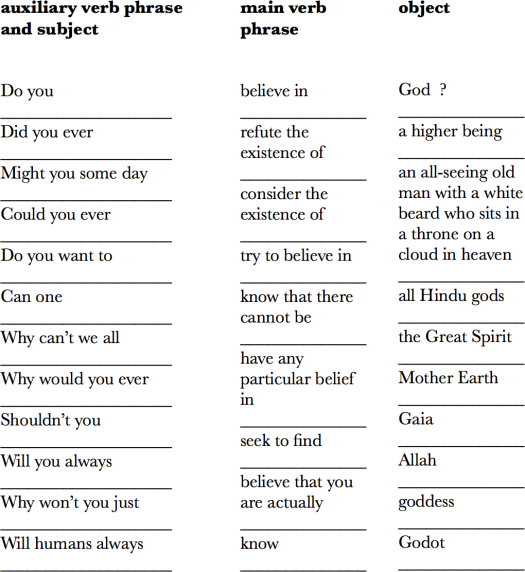
Take a random phrase from the left column, a random phrase from the middle column, and a random phrase from the right column. Combine them to construct a question about your belief in God. How many possible questions can you construct?
The answer is 1080. That doesn’t include the many many possible phrases you might want to include in this list. This illustrates the expansiveness of questioning everything. Since “God” is difficult to define, and since there are many ways to represent, understand, and experience God, one can’t truly answer the question “do you believe in God” unless the asker and answerer both share the same sense of what they are talking about
One conclusion from this exploration is that we cannot escape the realm of words and language in the effort to articulate the nature of our beliefs. Can any one think about belief without using some form of (internal or external) language?
Is belief naturally binary (I do believe vs. I don’t believe)? If it is not binary, can it be called a “belief”? Cultural/social forces and neural structures may cause a predisposition towards binarism in beliefs. In any case, I suspect that it is good to subdue these tendencies, for matters of intelligence as well as for social ease.
In my opinion (which could always change), agnosticism is (1) a good way to exercise one’s own intellectual agility, and (2) socially productive; it helps you hear and accept other people’s many kinds of beliefs, non-beliefs, assumed beliefs and believed assumptions.
True agnostics are not compelled to agree or disagree. In terms of epistemology, they are incapable of doing either.
No doubt, for many people, belief and faith are passionate and deeply-felt, and so it may not be easy to take such a dispassionate attitude. But as long as people are using language to question and express belief, the mechanics of logic necessarily come into play.
In that case, the art of living may be the wordless expression that escapes the realm of agreement and disagreement. Thus, God (or the absence of God) is best expressed in terms of how we live rather than what we say.
